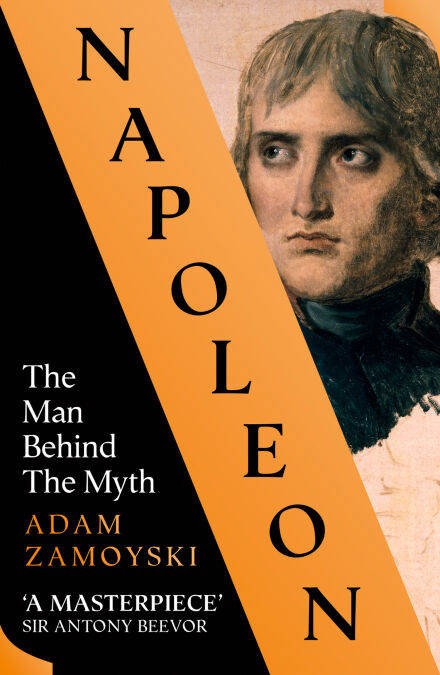
- Retrait gratuit dans votre magasin Club
- 7.000.000 titres dans notre catalogue
- Payer en toute sécurité
- Toujours un magasin près de chez vous
- Retrait gratuit dans votre magasin Club
- 7.000.0000 titres dans notre catalogue
- Payer en toute sécurité
- Toujours un magasin près de chez vous
Description
‘Napoleon is an out-and-out masterpiece and a joy to read’ Sir Antony Beevor, author of Stalingrad
A landmark new biography that presents the man behind the many myths. The first writer in English to go back to the original European sources, Adam Zamoyski’s portrait of Napoleon is historical biography at its finest.
Napoleon inspires passionately held and often conflicting visions. Was he a god-like genius, Romantic avatar, megalomaniac monster, compulsive warmonger or just a nasty little dictator?
While he displayed elements of these traits at certain times, Napoleon was none of these things. He was a man and, as Adam Zamoyski presents him in this landmark biography, a rather ordinary one at that. He exhibited some extraordinary qualities during some phases of his life but it is hard to credit genius to a general who presided over the worst (and self-inflicted) disaster in military history and who single-handedly destroyed the great enterprise he and others had toiled so hard to construct. A brilliant tactician, he was no strategist.
But nor was Napoleon an evil monster. He could be selfish and violent but there is no evidence of him wishing to inflict suffering gratuitously. His motives were mostly praiseworthy and his ambition no greater than that of contemporaries such as Alexander I of Russia, Wellington, Nelson and many more. What made his ambition exceptional was the scope it was accorded by circumstance.
Adam Zamoyski strips away the lacquer of prejudice and places Napoleon the man within the context of his times. In the 1790s, a young Napoleon entered a world at war, a bitter struggle for supremacy and survival with leaders motivated by a quest for power and by self-interest. He did not start this war but it dominated his life and continued, with one brief interruption, until his final defeat in 1815.
Based on primary sources in many European languages, and beautifully illustrated with portraits done only from life, this magnificent book examines how Napoleone Buonaparte, the boy from Corsica, became ‘Napoleon’; how he achieved what he did, and how it came about that he undid it. It does not justify or condemn but seeks instead to understand Napoleon’s extraordinary trajectory.
A landmark new biography that presents the man behind the many myths. The first writer in English to go back to the original European sources, Adam Zamoyski’s portrait of Napoleon is historical biography at its finest.
Napoleon inspires passionately held and often conflicting visions. Was he a god-like genius, Romantic avatar, megalomaniac monster, compulsive warmonger or just a nasty little dictator?
While he displayed elements of these traits at certain times, Napoleon was none of these things. He was a man and, as Adam Zamoyski presents him in this landmark biography, a rather ordinary one at that. He exhibited some extraordinary qualities during some phases of his life but it is hard to credit genius to a general who presided over the worst (and self-inflicted) disaster in military history and who single-handedly destroyed the great enterprise he and others had toiled so hard to construct. A brilliant tactician, he was no strategist.
But nor was Napoleon an evil monster. He could be selfish and violent but there is no evidence of him wishing to inflict suffering gratuitously. His motives were mostly praiseworthy and his ambition no greater than that of contemporaries such as Alexander I of Russia, Wellington, Nelson and many more. What made his ambition exceptional was the scope it was accorded by circumstance.
Adam Zamoyski strips away the lacquer of prejudice and places Napoleon the man within the context of his times. In the 1790s, a young Napoleon entered a world at war, a bitter struggle for supremacy and survival with leaders motivated by a quest for power and by self-interest. He did not start this war but it dominated his life and continued, with one brief interruption, until his final defeat in 1815.
Based on primary sources in many European languages, and beautifully illustrated with portraits done only from life, this magnificent book examines how Napoleone Buonaparte, the boy from Corsica, became ‘Napoleon’; how he achieved what he did, and how it came about that he undid it. It does not justify or condemn but seeks instead to understand Napoleon’s extraordinary trajectory.
Spécifications
Parties prenantes
- Auteur(s) :
- Editeur:
Contenu
- Nombre de pages :
- 752
- Langue:
- Anglais
Caractéristiques
- EAN:
- 9780008116088
- Date de parution :
- 17-10-18
- Format:
- Ebook
- Protection digitale:
- Adobe DRM
- Format numérique:
- ePub

Les avis
Nous publions uniquement les avis qui respectent les conditions requises. Consultez nos conditions pour les avis.






